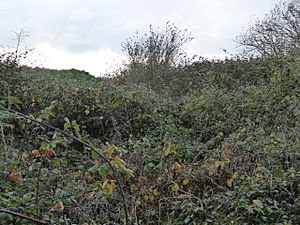Glandford (Hurdle Lane) facts for kids
| Site of Special Scientific Interest | |
 |
|
| Area of Search | Norfolk |
|---|---|
| Interest | Geological |
| Area | 9.4 hectares (23 acres) |
| Notification | 1992 |
| Location map | Magic Map |
Glandford (Hurdle Lane) is a special place in Norfolk, west of Sheringham. It covers about 9.4 hectares (which is like 23 football fields!). This site is important because it helps us understand the Earth's history.
It's known as a Site of Special Scientific Interest (SSSI) because of its unique geology. This means it has important rocks, landforms, or fossils. It's also part of the Norfolk Coast Area of Outstanding Natural Beauty, which is a protected area known for its beautiful scenery.
Contents
Why is Glandford (Hurdle Lane) Special?
Glandford (Hurdle Lane) is a working quarry. A quarry is a place where rocks, sand, or gravel are dug out of the ground. This particular quarry is in the valley of the River Glaven. It's not just any quarry, though; it's like a giant history book made of earth!
Clues from the Ice Age
The ground here holds many clues about the Pleistocene epoch. This was a time, long ago, when huge sheets of ice called glaciers covered much of the Earth. These glaciers moved slowly, carving out valleys and leaving behind different layers of material.
At Glandford (Hurdle Lane), scientists can study these layers. They find different types of deposits, like:
- Till: This is a mix of clay, sand, gravel, and boulders that glaciers dropped.
- Lacustrine silts: These are fine muds and clays that settled at the bottom of ancient lakes formed by melting glaciers.
- Calcareous sands and gravels: These are coarser materials, often containing calcium carbonate, also left behind by the ice.
By looking at these layers, geologists can learn how the glaciers moved and changed the landscape in this area over thousands of years. It helps us understand the Earth's past climate and how our planet has evolved.
Protecting Our Geological History
Because of its importance, Glandford (Hurdle Lane) is also a Geological Conservation Review site. This means it's recognized nationally as one of the best places to study geology in the UK. Protecting sites like this helps scientists continue to learn about our planet's amazing history.
Visiting Glandford (Hurdle Lane)
It's important to know that Glandford (Hurdle Lane) is private land. This means there is no public access for visitors. Its main purpose is for scientific study and quarrying operations.

